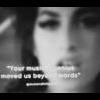
Young at heart: Tony Bennett at 85
The singer tells Neil McCormick why he still loves the business – and how much he was affected by recording his duet with Amy Winehouse, three months before her death.
http://www.telegraph...nett-at-85.html
Part One
In the air-conditioned chill of studio three at Abbey Road, producers and engineers hovered over a vast recording console, setting levels. A handwritten sign proclaimed 'This console has 12,974 buttons'. A small group of record company representatives gravitated towards a buffet of sandwiches and crisps, talking business in hushed tones. No
one paid the slightest attention to the dapper, grey-haired gentleman sitting quietly in a corner. Immaculately turned out in white shirt, braces and tie, with his suit jacket folded over a chair, he peered through thick spectacles, scratching the surface of a Post-it note with a Biro. Every now and then he looked up. ‘The trouble when you sketch with a pen,
you can’t make mistakes,’ murmured Tony Bennett, contemplating his portrait of a studio engineer.Through a clear glass division, inside the recording booth, two microphones stood side by side. ‘She’s in the building,’ someone announced. ‘She just needs a little time. She was semi-attacked by paparazzi, but she’s fine, she’s not upset.’ ‘Bop da ba da bop bop,’ Bennett sang softly, to himself, as he continued sketching. ‘Let her take her time,’ he said. ‘We got plenty of time.’
an entourage of management, PRs and stylists fussing over her.
The legendary 85-year-old crooner was patiently awaiting the arrival of Amy Winehouse. On March 23 this year, Amy Winehouse recorded a single with Tony Bennett for his new album, Duets II. It was the
young British soul singer’s first publicly acknowledged recording session in over a year, and Abbey Road was surrounded by a scrum of photographers and fans. She finally entered the studio an hour late and forgivably flustered,
The quiet ambience dramatically shifted, suddenly the room seemed packed and bustling with activity, with Winehouse at its centre. Stylishly turned out in minidress, knitted cardigan, big hair and bold eyeliner, she made a beeline for Bennett, gushing, ‘We love you, we love you, we love you so much.' 'Thank you,' said Bennett, who never lets a compliment go unacknowledged. ‘You’re sweet.’
‘I’m not going to cry,’ Winehouse snuffled, as Bennett took her hands. Her almost comically casual air of youthful confidence (peppering conversation with ‘all right’ and ‘whatever’) evaporated in front of her idol, although Bennett was doing his best to put her at ease. Slipping his jacket on, red handkerchief poking from his breast pocket, he guided Winehouse, with an almost imperceptible touch, into the recording booth, murmuring, ‘We’ll just run it over till you get comfortable.’
Watching them side by side at their microphones was like witnessing a masterclass in jazz improvisation. Dapper and calm, left hand tucked in pocket, Bennett sang quietly and talkatively, feeling his way up and down the melody of the 1930s classic Body and Soul while remaining intently focused on his singing partner. Bennett talked to her about the song’s composer, Johnny Green – ‘he was a friend of mine, a tremendous intellectual’ – and its history, from a Coleman Hawkins instrumental to ‘the official standard of popular light entertainment’ recorded by Billie Holiday,
Ella Fitzgerald, Frank Sinatra and Bennett himself. Winehouse was clearly in awe of the whole situation, unable to look Bennett in the eye, staring at the floor and the ceiling, chewing on her hair and sleeve, swaying nervously. Yet her singing belied her youth and nerves.The voice that emerged was rich and ancient, cracked and bluesy, flowing around the song in jazzy glides and fluid bursts that would dazzle and explode then peter out at dead ends, where she would tut and grunt and bite her lips in frustration. ‘I haven’t done this in a long time,’ she apologised, head hanging, eyes fixed on the floor. ‘And I’m nervous because it’s you.’ Bennett kept up a murmur of encouraging patter. ‘It’s just like we’re talking to each other,’ he reassured her. ‘You’re
feeling it real good. I like it.’ Take after take unfolded with Bennett drawing a performance out of Winehouse, while at the same time blending his thinner, smokier voice with her rich tone. ‘Do you like Dinah Washington?’ he asked.‘You remind me of her.’ Winehouse blushed with pleasure at being compared with one of her heroines. And when Bennett crooned, ‘For you, for you dear only,’ a lovely, secret smile lit up her face. Three months later, Winehouse was dead. ‘I broke down and sobbed when I heard the news,’ Bennett admits. ‘I’ll tell you, of all the young people I’ve met over the past 50 years, she sang the right way. It’s funny to say that, because there’s a lot of singers that sound wonderful, but she sang for the moment, and that’s honest. She was ready to take a chance, right on the spot, right on the microphone, she’d try a different phrasing, she knew how to improvise, it was spontaneous and intimate. That’s what I loved about her. She was really herself.
Since Elvis Presley and the Beatles really changed the game, and into big stadiums, music became like a big football game and it lost the intimacy that really makes it interesting to me. But Amy had that, she was a true talent, and she was on her way to becoming a very, very important jazz singer. What a tragedy. Just 27 years old. It’s so regretful. It’s heartbreaking.’ Bennett will be donating his share of proceeds from their duet to the foundation Winehouse’s father Mitch is setting up in her name. ‘I’d like to really have had a chance to talk to her. Because that’s what happened to me.
I was almost the Amy Winehouse of my day.’ Bennett has such a humble manner, so softly spoken, it is difficult to picture him in his carousing younger days – a jet-black-haired handsome crooner, playing Las Vegas and, like his hero Frank Sinatra, doing his best to resist changing fashions and new popular music styles. He is clearly hesitant about acknowledging
how far he might have drifted from his own ideals, yet has previously admitted problems with alcohol, pot and cocaine, almost dying from a cocaine overdose in 1979, when he had to be revived in the bath by his second wife, Sandra Grant.‘I was caught up in it when I was younger. When the Kennedys got assassinated, and Martin Luther King, our country took a terrible turn, and everybody got wasted. In those days I was hiding, I was in a room somewhere getting high, that’s not a correct way to live.’ He is (perhaps deliberately) vague about when his drug use came to an end, though he
recalls one particular conversation that resonated with him. ‘I was talking to Woody Allen’s manager, Jeff Rawlins, and he said he used to handle Lenny Bruce. I said, “Oh, I knew Lenny, what did you think of him?” And he said, “He sinned against his talent.” That line changed my life, I threw away all kinds of corruption out of my system, I just went back to being pretty normal.’
Edited by Lainey, 02 September 2011 - 05:27 PM.



















